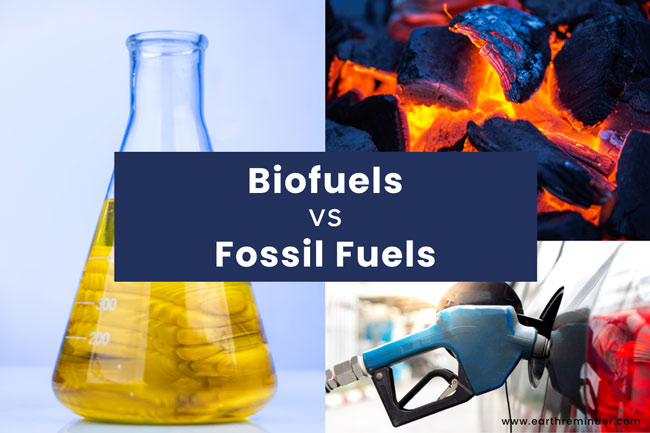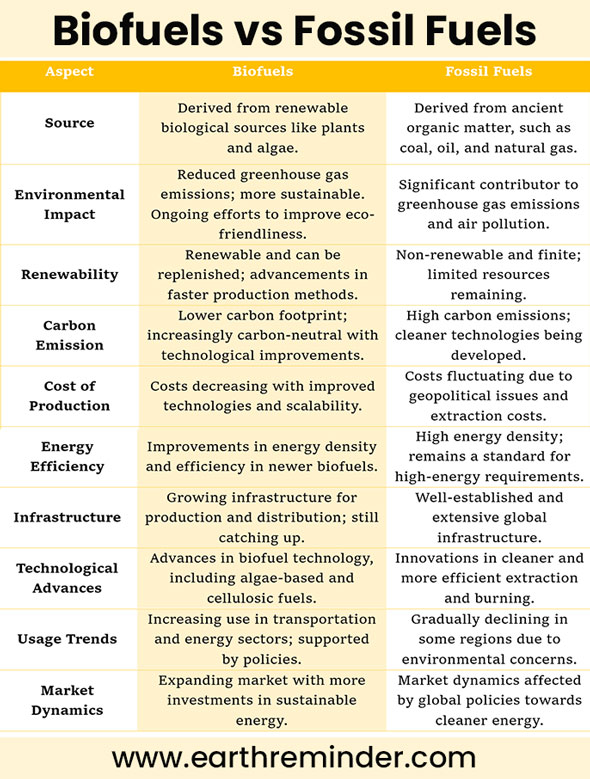Difference Between Biofuels and Fossil Fuels
Biofuels and fossil fuels are two types of energy sources. Biofuels come from plants and can be grown again. Oil and coal are fossil fuels that come from old plants and animals on earth. This process takes long time. There are lots of ways we use these fuels, but they’re different in how they impact our planet and how we can recycle them. We need to understand the difference between biofuels and fossil fuels to make smart and efficient energy choices.
Table of Contents
What Are Biofuels?
Biofuels are fuels made from living things or their waste. They come from plants or animals. Let’s understand briefly:
- Plants: Biofuels for example, ethanol can be made from crops like corn, sugarcane, or wheat. Sunlight helps these plants grow, and they can be turned into fuel when processed.
- Animal Fats: Biodiesel can be made from animal fats. Fat from the processing of meat or even used cooking oils containing animal fats can be included in this category.
It is important to note that biodiesel isn’t made by killing animals. A lot of biodiesels are made from leftovers, like old cooking oil or animal fats. For example, after meat is taken for food, there are often leftover fats and greases. Biodiesel can be made from such resources instead of throwing them away. The purpose of this is to make fuel from waste materials without harming animals in the process.
People use them instead of oil and coal to power cars, trucks, and other machines. They’re good for the environment because they reduce pollution and don’t add extra CO2 to the atmosphere. The good thing about them is that they’re renewable, unlike oil or coal, which is limited.
Also Read: Biomass Energy: Types, Advantages and Disadvantages.
What Are Fossil Fuels?
Fossil fuels are fuels made from old plants and animals. They are buried deep in the earth. They turn into coal, oil, and natural gas after millions of years. We burn these fuels for energy. You can use this energy for electricity, heating, and to run your vehicle or factory. The problem is that fossil fuels cause pollution and contribute to global warming.
While renewable energy sources like solar and wind are on the rise, fossil fuels remain the basis for more than 70% of energy in 2023, a decrease from about 82% in 2022.
Let’s check below biofuels vs fossil fuels in terms of efficiency, emissions, etc.
Difference Between Biofuels and Fossil Fuels: Biofuels vs Fossil Fuels
Below we will compare biofuels and fossil fuels:
| Aspect | Biofuels | Fossil Fuels |
| Source | Derived from renewable biological sources like plants and algae. | Derived from ancient organic matter, such as coal, oil, and natural gas. |
| Environmental Impact | Reduced greenhouse gas emissions; more sustainable. Ongoing efforts to improve Eco-friendliness. | Significant contributor to greenhouse gas emissions and air pollution. |
| Renewability | Renewable and can be replenished; advancements in faster production methods. | Non-renewable and finite; limited resources remaining. |
| Carbon Emission | Lower carbon footprint; increasingly carbon-neutral with technological improvements. | High carbon emissions; cleaner technologies being developed. |
| Cost of Production | Costs decreasing with improved technologies and scalability. | Costs fluctuating due to geopolitical issues and extraction costs. |
| Energy Efficiency | Improvements in energy density and efficiency in newer biofuels. | High energy density; remains a standard for high-energy requirements. |
| Infrastructure | Growing infrastructure for production and distribution; still catching up. | Well-established and extensive global infrastructure. |
| Technological Advances | Advances in biofuel technology, including algae-based and cellulosic fuels. | Innovations in cleaner and more efficient extraction and burning. |
| Usage Trends | Increasing use in transportation and energy sectors; supported by policies. | Gradually declining in some regions due to environmental concerns. |
| Market Dynamics | Expanding market with more investments in sustainable energy. | Market dynamics affected by global policies towards cleaner energy. |
Similarities Between Biofuels and Fossil Fuels
Biofuels and fossil fuels have some similarities:
- Source of Energy: Cars and electricity are both powered by both kinds of energy.
- Carbon-based: Carbon is essential to their combustion and energy release.
- Burned for Power: In engines and power plants, these fuels are burned in order to release power.
- Transportation and Storage: Both can be transported and stored in similar ways.
Conclusion
Both biofuels and fossil fuels are used for energy, but they’re different. Plants and waste make biofuels. They can grow again and are better for the environment. The earth gives us fossil fuels like oil and coal. The process takes a long time and they’re more polluting. Biofuels are better for the environment and can be made again, while fossil fuels won’t last forever and can harm the air. We can save the planet by choosing biofuels.

